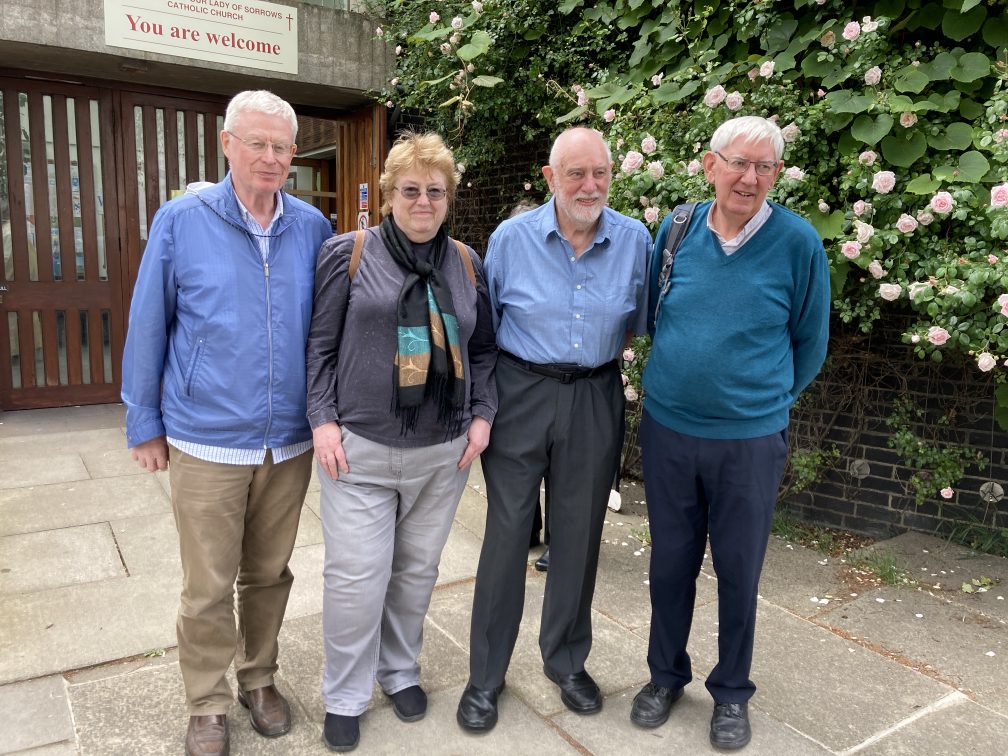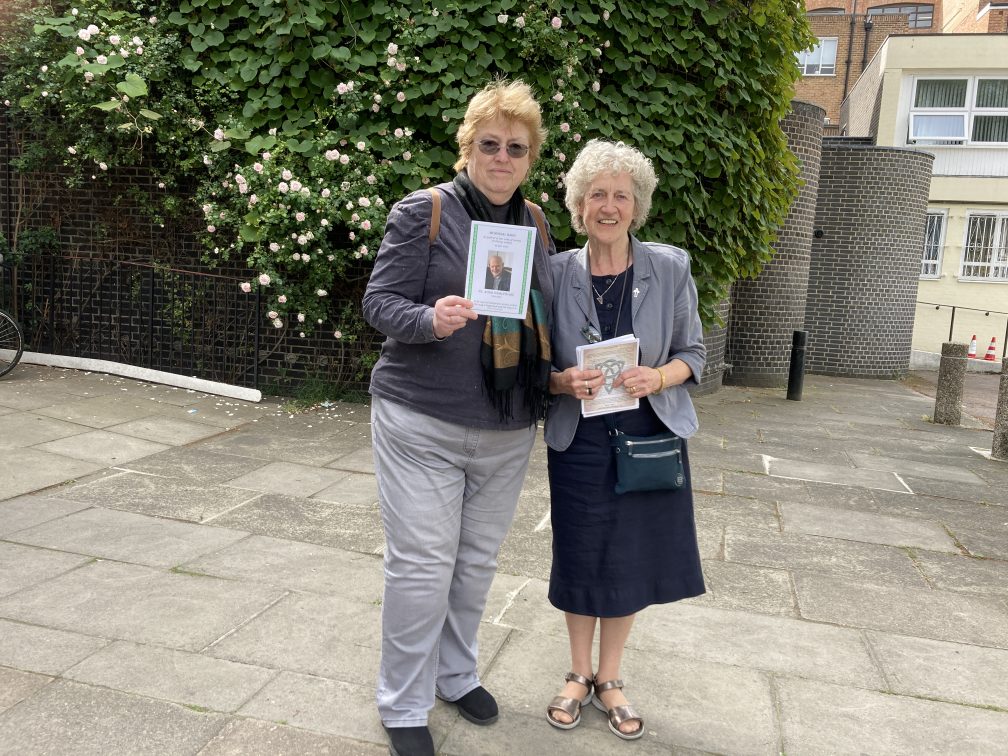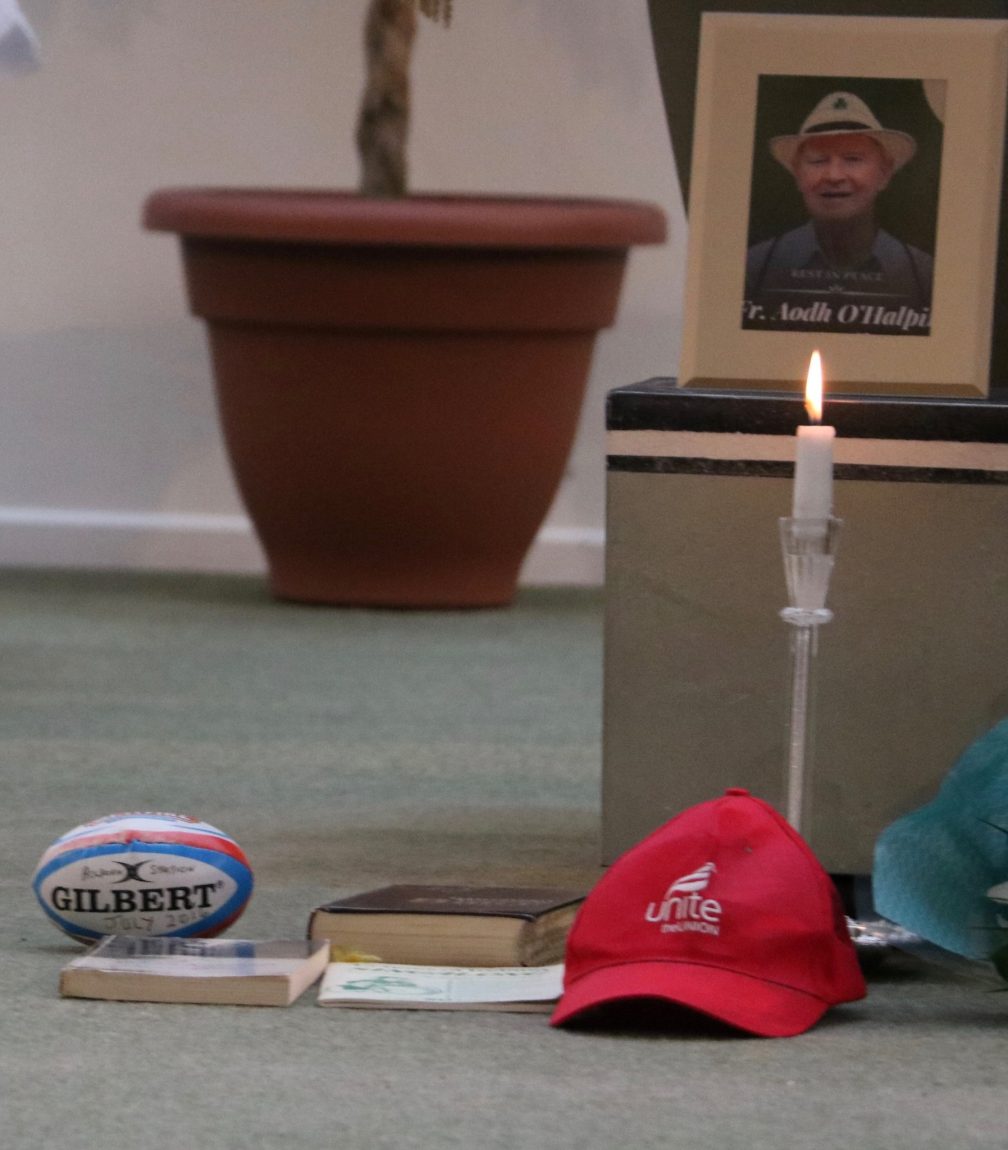Migrant Workers in Britain paid warm tributes to Columban Father Aodh O’Halpin at a Mass they organised for him in London on 28th May. He died on 2nd April 2022, at the age of 88 in Ireland, after illness forced him to move into the Columban retirement home in Dalgan just a few months earlier. The lively Mass gave opportunity for his friends and colleagues in Britain to honour his four-decade long ministry to migrants, particularly domestic worker groups, in London.
Mass in the packed church of St. Gabriel of Our Lady of Sorrows in Upper Holloway, London, was celebrated by Fr. Daniel O’Malley, with a homily by Fr. Ray Collier, both of whom are Columbans who worked with Aodh in both the Philippines and in Britain. Aodh used to visit regularly an outreach project of St. Gabriel’s which provides lunches and food bags to people struggling to afford to buy food. Two Spiritan priests of the parish concelebrated – Fr. Oliver Ugwu, who welcomed the people, and Fr. Benedict Baka. Fr. Gideon Wagay, a Filipino priest from the Sacred Heart of Jesus parish in Holloway, also attended.
As the congregation arrived at St. Gabriel’s, a large banner picturing Aodh with ‘Forever in our hearts’ greeted them. The congregation was packed with migrants who knew Aodh personally, plus religious and friends in Justice and Peace. On the altar was a display stand ‘Justice for all Migrant Workers’, placed by the Waling-Waling Organisation.
In his homily, Fr. Ray Collier said Aodh’s joy, informality and inclusiveness would be sorely missed. In the Philippine Island of Mindanao from 1958, “his mission was not so much about administering sacraments but going out to be active among God’s people, especially during the repression of the Marcos years.” Then, for more than four decades, he and St. Louis Sister Margaret Healy worked with migrants in Britain, especially Filipino migrants and those who were enslaved or unjustly accused of crimes. Aodh and Margaret “had the smell of the sheep on them” said Fr. Ray, quoting Pope Francis. Fr. Ray said that behind Aodh’s gentleness, warmth and informality lay a prophetic man with, “steely determination to share the anxieties of those deemed insignificant and in this ministry he crossed faiths and cultures.”
In just one of the tributes from migrants, Nonoi Hackbang thanked Aodh for his “six decades of support for people struggling for justice in the Philippines and Britain.” Also, the Columban Missionary Society who gave him welcome and shelter when he was on the run from the Marcos dictatorship in the 1970s. This hospitality continued to be offered at Columban houses in London – first at Hampstead and then at Ealing.
Some remembered Aodh helping domestic workers to escape from abusive employers and to change their employers. Others remembered his “amazing engagements with the poor, needy and homeless” – always talking with homeless people he encountered and having cash in his pocket to share – not coins but notes. The Filipino community sang an Aodh favourite, ‘Bagbabalik’ or ‘Migrant’s Song’, in Tagalog, which focused on someone longing to go back to their native home but circumstances preventing this.
The congregation clapped when it was mentioned that Aodh “tackled Britain’s immigration laws”. Over the years – along with Sr Margaret Healy, Waling Waling, Kalayaan, the Transport and General Workers Union (now Unite) and other organisations – over 4,000 migrant domestic workers were assisted in winning their rights as workers in the UK, including applying for settlement. With support, workers from Indonesia, India, Sri Lanka, Morocco, Nigeria, Benin Republic and the Philippines obtained domestic worker visas. Many had served in private households, often experiencing long hours, low wages and often slave-like working conditions. A vibrant group of them always attended the annual Migrants Mass in London with a colourful banner.
The Offertory Procession at last Saturday’s Mass offered symbols which reflected Aodh’s life: a Holding Cross symbolising his humility and simplicity; a Bible which informed his lifetime’s commitment to justice, peace and ecology; a small rugby ball which was given to him by a homeless person and therefore highly valued; a book of Irish songs reflecting Aodh’s great love of gatherings, relating stories and singing, and the collected poems of Patrick Kavanagh, because of Aodh’s love of poetry. All the symbols prompted clapping but there was a huge cheer when Aodh’s red ‘Unite’ baseball cap – which he often wore – was held high as it was brought up the central aisle, reflecting his commitment to rights of workers and the work of trade unions.
Throughout, beautiful music was provided by Iwona & Jasmine Szczypta. ‘The lord’s my shepherd’ by Stuart Townsend was particularly appreciated, with its chorus, ‘I will trust in you alone.’
Interesting insights from Aodh’s niece Louise spoke about his mother raising 13 children alone from the age of 38 after his father died. “It gave him great respect for women” she said. And she recounted his love of the young people of the family, “giving freely of his time and attention, as well as being central to family celebrations – Christenings, marriages, blessings, burials.”
In all accounts he was recognised as a man of compassion, love and humour who was most comfortable engaging with people at the peripheries of society. And not only humans – his care for animals was remembered, particularly feeding London foxes in his garden.
A description of Aodh used in several reports was “unique” and at the end the congregation was called to respond ‘Presente’ as his name was said three times. The response was louder each time, with a great cheer after the final ‘PRESENTE,’ before the congregation moved to a social gathering nearby.





